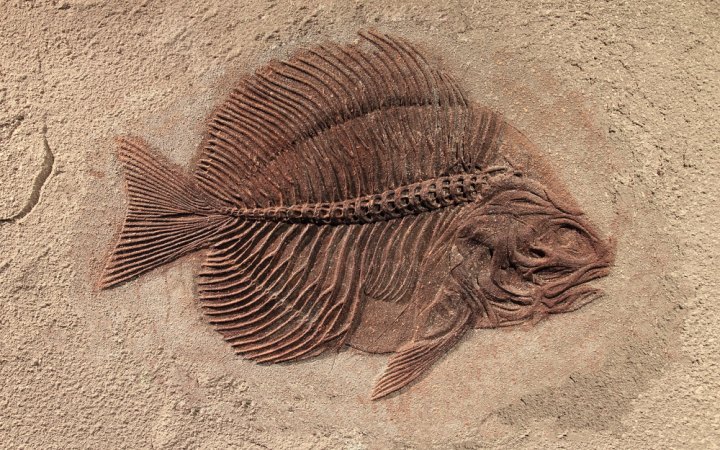第二十一章 生命在前进
It isn't easy to become a fossil. The fate of nearly all living organisms—over 99.9 percent of them—is to compost down to nothingness. When your spark is gone, every molecule you own will be nibbled off you or sluiced away to be put to use in some other system. That's just the way it is. Even if you make it into the small pool of organisms, the less than 0.1 percent, that don't get devoured, the chances of being fossilized are very small.
要变成化石可不容易。几乎所有的生物——其中的99.9%以上——的命运是化为乌有。你的生命火花一旦熄灭,你曾拥有的每个分子都将被啃掉或被冲走,用来形成另一个体系。事情就是那样。即使你把那个不足千分之一的部分变成一小摊微生物而没有被吃掉的话,变成化石的可能性也很小。

In order to become a fossil, several things must happen. First, you must die in the right place. Only about 15 percent of rocks can preserve fossils, so it's no good keeling over on a future site of granite. In practical terms the deceased must become buried in sediment, where it can leave an impression, like a leaf in wet mud, or decompose without exposure to oxygen, permitting the molecules in its bones and hard parts (and very occasionally softer parts) to be replaced by dissolved minerals, creating a petrified copy of the original. Then as the sediments in which the fossil lies are carelessly pressed and folded and pushed about by Earth's processes, the fossil must somehow maintain an identifiable shape. Finally, but above all, after tens of millions or perhaps hundreds of millions of years hidden away, it must be found and recognized as something worth keeping.
若要变成化石,必须具备几个条件。首先,你得死在恰当的地方。只有大约l5%的岩石能够保存化石,因此倒在一个未来的花岗岩所在地是没有用处的。实际上,死者必须埋在沉积物里,在那里留下个印子,就像泥泞里的一片叶子那样,或者在不接触氧气的情况下腐烂,让骨头和坚硬的部分(在极少数情况下还有较软的部分)里的分子由溶解的矿物质取而代之,按原件创造出一个石化的版本。接着,在化石所在的沉积物经受地球运动的随意挤压、折叠和推动的过程中,化石必须设法保持一种可以识别的形状。最后,尤其重要的是,在藏匿几千万或几亿年以后,还得有人发现,认为这是值得收藏的东西。
来源:可可英语 http://www.kekenet.com/Article/201809/565667.shtml











